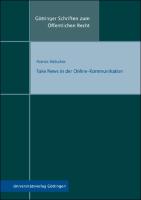Fake News in der Online-Kommunikation
Eine Betrachtung des verfassungsrechtlichen Kommunikationsschutzes von Fake News im Zusammenhang mit neuen Kommunikationsmitteln, ihrer Regulierbarkeit, ihrer einfach-gesetzlichen Regulierung de lege lata sowie der gesetzgeberischen Handlungsoptionen de lege ferenda
| dc.contributor.author | Nölscher, Patrick | |
| dc.date.accessioned | 2024-03-30T04:31:42Z | |
| dc.date.available | 2024-03-30T04:31:42Z | |
| dc.date.issued | 2023 | |
| dc.identifier | OCN: 1428751096 | |
| dc.identifier.uri | https://library.oapen.org/handle/20.500.12657/88770 | |
| dc.description.abstract | For as long as anyone can remember, fake news has been a central problem for the formation of individual and public opinion. Today, the effect of widespread disinformation is amplified by the technical possibilities of online communication, such as echo chambers in social networks or the use of artificial opinion amplifiers. From a cognitive science perspective, it is very difficult to correct the effects of disinformation once it has been expressed. The paper therefore deals with the protection of fake news in online communication under fundamental law on the basis of the case law of the German Federal Constitutional Court, the European Court of Human Rights and an epistemological view, taking into account newer communication modalities such as content dissemination in social networks and video sharing services as well as the dissemination of statements with the help of social bots. After describing the constitutional regulatory framework of the dissemination of fake news, the work is devoted to their regulation in Germany de lege lata. On the one hand, the paper focuses on explaining and evaluating the existing regulation of social bots under the Interstate Treaty on the Media (MStV), taking into account higher-ranking law. On the other hand, the thesis discusses and evaluates the regulation of social networks and video sharing services on the basis of the more recent Digital Services Act (DSA) in comparison to the Network Enforcement Act (NetzDG) and points out areas of tension under basic communications law. Based on the insights gained from the evaluations of existing regulation and the constitutional standards described in relation to the dissemination of disinformation, it is possible to formulate options for action for the (German) legislator that could increase protection against the influence of disinformation on individual and public opinion formation in the context of social bot communication and communication in social networks as well as video sharing services. | |
| dc.language | German | |
| dc.subject.classification | bic Book Industry Communication::L Law | |
| dc.subject.other | constitutional regulatory framework | |
| dc.subject.other | Digital Services Act (DSA) | |
| dc.subject.other | Network Enforcement Act (NetzDG) | |
| dc.subject.other | Interstate Treaty on the Media (MStV) | |
| dc.title | Fake News in der Online-Kommunikation | |
| dc.title.alternative | Eine Betrachtung des verfassungsrechtlichen Kommunikationsschutzes von Fake News im Zusammenhang mit neuen Kommunikationsmitteln, ihrer Regulierbarkeit, ihrer einfach-gesetzlichen Regulierung de lege lata sowie der gesetzgeberischen Handlungsoptionen de lege ferenda | |
| dc.type | book | |
| oapen.identifier.doi | 10.17875/gup2023-2438 | |
| oapen.relation.isPublishedBy | ffaff15c-73ed-45cd-8be1-56a881b51f62 | |
| oapen.collection | AG Universitätsverlage | |
| oapen.description.otherlanguage | „Fake News“ bilden seit Menschengedenken ein zentrales Problem für die individuelle und öffentliche Meinungsbildung. Dabei wird die Wirkung verbreiteter Desinformation heutzutage durch die technischen Möglichkeiten im Bereich der Online-Kommunikation, etwa durch die Echokammern in sozialen Netzwerken oder den Einsatz künstlicher Meinungsverstärker, mitunter noch verstärkt. Effekte von einmal geäußerter Desinformation lassen sich aus kognitionswissenschaftlicher Perspektive nur noch sehr schwer korrigieren. Die Arbeit beschäftigt sich daher mit dem (kommunikations-)grundrechtlichen Schutz von „Fake News“ in der Online-Kommunikation anhand der Rechtsprechung des Bundesverfassungsgerichts, des Europäischen Gerichtshofs für Menschenrechte und einer erkenntnistheoretischen Ansicht unter Berücksichtigung neuerer Kommunikationsmodalitäten wie der Inhaltsvermittlung in sozialen Netzwerken und Videosharing-Diensten sowie der Äußerungsverbreitung mithilfe von „Social Bots“. Nach der Beschreibung des verfassungsrechtlichen Regulierungsrahmens der Verbreitung von „Fake News“ widmet sich die Arbeit ihrer Regulierung in Deutschland de lege lata. Im Schwerpunkt erläutert und evaluiert die Arbeit zum einen die bestehende Regulierung von „Social Bots“ nach dem Medienstaatsvertrag (MStV) unter Berücksichtigung des höherrangigen Rechts. Zum anderen erörtert und evaluiert die Arbeit die Regulierung von sozialen Netzwerken und Videosharing-Diensten anhand des jüngeren Digital Services Acts (DSA) im Vergleich zum Netzwerkdurchsetzungsgesetz (NetzDG) und weist auf kommunikationsgrundrechtliche Spannungsfelder hin. Auf Grundlage der aus den Evaluationen der vorhandenen Regulierung gewonnenen Erkenntnisse und den in Bezug auf die Desinformationsverbreitung beschriebenen verfassungsrechtlichen Maßstäbe gelingt es, Handlungsoptionen für den (deutschen) Gesetzgeber zu formulieren, die den Schutz vor der Einflussnahme von Desinformation auf die individuelle und öffentliche Meinungsbildung im Kontext der „Social Bot“-Kommunikation und der Kommunikation in sozialen Netzwerken sowie Videosharing-Diensten erhöhen könnten. |

